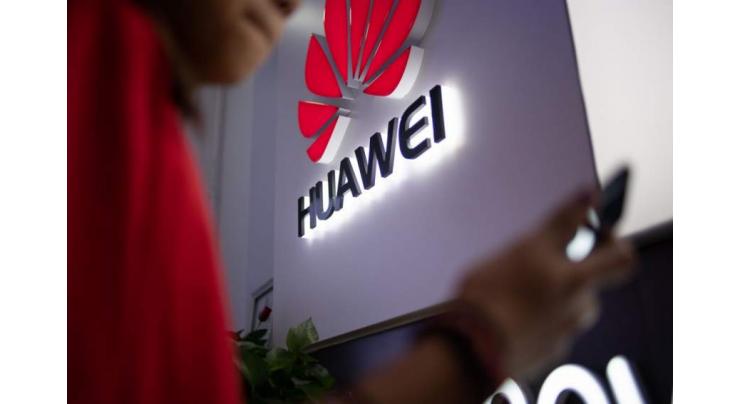
Attacks On Huawei Set 'Very Bad' Precedent For Businesses Across US - Company
Umer Jamshaid Published September 11, 2019 | 12:18 PM

Washington's pressure on Chinese tech giant Huawei is a "very bad" precedent for all businesses across the United States, which has demonstrated that it could "attack" any company "without any proof," Abraham Liu, the Huawei chief representative to European institutions, told RIA Novosti in an interview
BRUSSELS (UrduPoint News / Sputnik - 10th September, 2019) Washington's pressure on Chinese tech giant Huawei is a "very bad" precedent for all businesses across the United States, which has demonstrated that it could "attack" any company "without any proof," Abraham Liu, the Huawei chief representative to European institutions, told RIA Novosti in an interview.
The United States accuses Huawei of collaborating with the Chinese military and intelligence and using its equipment for illegal surveillance purposes, something that the company refutes as unjustified, politically motivated and anti-competitive practices. In May, Washington blacklisted Huawei and about 70 of its affiliates from purchasing US technology and doing business with US companies, including Google, without relevant government authorization. It has since delayed a full-scale trade ban on Huawei several times, most recently on August 19.
"Actually, I do not know how Google thinks, and how other US business leaders think. Because if I were them, I would have been worried about the signal sent by the US government's behaviour to the external business partners. I would have been thinking about what if this time it was Huawei, but what is about next time, if that also could happen to anyone else. Because without any proof the US can just attack you," Liu said.
He added that "for example, the car sector could be hit because of national security issue.
"
When asked whether the US pressure on Huawei set a bad precedent for business in general, the Huawei official replied: "very bad example, very bad example."
Liu noted that Huawei was a private company, which has a business continuity management system in place that "US company IBM helped us put in place."
"So, we can still manage to survive. But what about other companies?" he wondered.
Huawei, according to Liu, did manage to turn the pressure of US sanctions to its advantage.
"I think, they helped us, the employees, to be more united. When external pressure came, Huawei as a 100% employee-owned company has been stimulated to work better and harder. And I see a great power and a great strength coming from this unity," he pointed out.
According to Liu, the situation has also helped the company become "more conscious" and realize the need to be "less dependent on the US supply chain."
"And in that sense I think for the short term we have been damaged a bit, but in a long term we will be much stronger than before," he concluded.
Along with waging a war against the Chinese tech giant in the US market, Washington has also been pressing others to give up using Huawei equipment and infrastructure for the next generation of 5G networks, with a number of countries in the West already following suit.
Related Topics
Recent Stories

Robinson, bowlers help New Zealand go 2-1 up against Pakistan

Shahzeb Chachar to hold khuli kachehri on April 26

Heatwave amid Israel's aggression in Gaza brings new misery, disease risk

Tourism must change, mayor says as Venice launches entry fee

Court adjourns Judicial Complex attack case till May 17

Nasreen Noori’s book ‘Popatan Jahra Khwab’ launched

Wafaqi Mohtasib inspection team visits Excise and taxation office

AJLAC announces 5th Conference titled ‘People’s Mandate: Safeguarding Civil ..

Pak-US officials engage to enhance trade, investment ties

IBCC to promote educational excellence, expand regional presence

Pakistani 'Blue Helmets' serving UN Peacekeeping Mission in DR Congo set to leav ..

Putin says plans to visit China in May
More Stories From Business
-
Chinese minister felicitates Ahsan Iqbal on reappointment as Planning minister
2 hours ago -

Pak-US officials engage to enhance trade, investment ties
3 hours ago -

Stocks fall as tech shares sink, US economy slows
4 hours ago -

Higher taxes, awareness help decrease cigarettes sale in Pakistan
5 hours ago -

Ahsan Iqbal chairs CPEC JWGs, 13th JCC review-meeting
5 hours ago -

Industries Minister recommends urea fertilizer import to stabilize prices and supply
5 hours ago
-

Honda announces US$11 bn EV battery and vehicle plant in Canada
5 hours ago -

Zhao Shirin calls on Punjab Industries Minister
5 hours ago -

CEO APM Terminals calls on Finance Minister
5 hours ago -

SACM visits GTVC checks attendance register
5 hours ago -

CEO APM Terminals meets Commerce Minister
5 hours ago -

RTO destroys huge quantity of non-duty paid cigarettes
6 hours ago
















